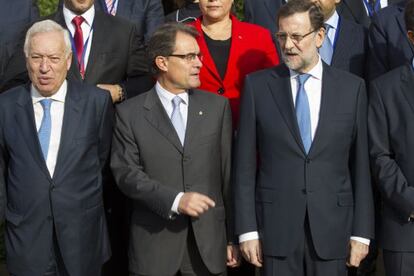Foreign Ministry mobilizes envoys against Catalan independence
“Separatism breaks co-existence,” Margallo’s guidelines for embassies say

The Foreign Ministry has embarked on a major diplomatic offensive across the globe against Catalan pro-independence forces by ordering Spanish envoys to explain why secession is not the answer for Catalonia or Spain.
Foreign Minister José Manuel García-Margallo has sent out a 210-page manual to Spain’s 118 embassies and more than 90 consulates abroad, as well as to Spanish representatives who hold seats in 11 multilateral organizations. The handbook instructs the envoys point-by-point how to argue against Catalan independence and explain the reasons why the central government is against allowing next year’s referendum to take place.
“When a political cause is unilaterally proposed and followed by the end of co-existence, it is improper to refer to it as a democratic principle,” reads part of the book entitled Por la convivencia democrática (In favor of democratic co-existence). The manual was inspired by British Prime Minister David Cameron’s “Stronger Together” campaign, designed to explain his government’s views on next year’s Scottish referendum.
“Never since the recovery of freedoms has Catalan society undergone episodes of anguish, social fragmentation and risk of confrontation as it is experiencing now,” it reads. “The drive for independence has caused confusion and dismay in Spanish society, including a large part of the Catalan people.”
“The separatists are trying to portray Spain as a colonial power”
The thesis of the internal document, which is filled with quotes by Catalan writers as well as observers from Spain and abroad, focuses on the argument that independence is not a democratic option, but would instead break the framework of co-existence and harmony built during the Transition.
In answer to the insistence of regional premier Artur Mas on holding the referendum and his refusal to reach a compromise, the ministry states that Prime Minister Mariano Rajoy’s invitation to dialogue “has no expiry date.”
Mas, his governing Catalan CiU nationalist bloc and other pro-independence parties announced earlier this month a November 9 referendum date. Rajoy, who has called the vote illegal, has said he will “guarantee” that it will not be held.
Going over pro-independence movement arguments in favor of secession, the ministry covers the case against an independent Catalonia step by step.
“It can be said with all historic exactitude that Catalonia has never, in its history of democracy, reached a greater degree of self-government in all areas, including its politics, economy and culture, as it accomplished on the day in which, by virtue of the Constitution and Estatut, the institutions of self-government were returned to Catalonia,” the manual reads.
The Constitution — which the Rajoy government argues does not allow any region to secede from Spain — was approved by 91.9 percent of Catalans in 1978 in a region where there was 68 percent voter turnout. “Never have the people of Catalonia surpassed that level of voter participation.”
As for international law, the ministry argues that self-determination is permitted in former colonies, communities where citizens are oppressed or regions where there are blatant human rights violations. “In view of these requisites, the separatists are trying to portray Spain as a colonial and totalitarian power that only holds some of its citizens prisoners through force,” the manual states.
Tu suscripción se está usando en otro dispositivo
¿Quieres añadir otro usuario a tu suscripción?
Si continúas leyendo en este dispositivo, no se podrá leer en el otro.
FlechaTu suscripción se está usando en otro dispositivo y solo puedes acceder a EL PAÍS desde un dispositivo a la vez.
Si quieres compartir tu cuenta, cambia tu suscripción a la modalidad Premium, así podrás añadir otro usuario. Cada uno accederá con su propia cuenta de email, lo que os permitirá personalizar vuestra experiencia en EL PAÍS.
¿Tienes una suscripción de empresa? Accede aquí para contratar más cuentas.
En el caso de no saber quién está usando tu cuenta, te recomendamos cambiar tu contraseña aquí.
Si decides continuar compartiendo tu cuenta, este mensaje se mostrará en tu dispositivo y en el de la otra persona que está usando tu cuenta de forma indefinida, afectando a tu experiencia de lectura. Puedes consultar aquí los términos y condiciones de la suscripción digital.









































